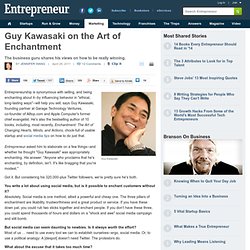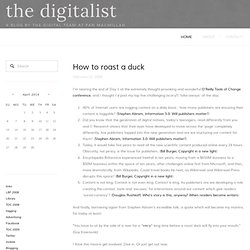

Presentation/slides: Deep Learning is no longer possible W207 #nlexpo13 Mon 26 Aug 2013. KNOWLEDGE-ABLE: Unlearning, Relearning, Remixing.
Learn, unlearn, relearn ... or become illiterate in the 21st Century? LifeNaut. Create... remix... mashup. Digital literacy: ? As important as = Where would you go? How would you come to understanding? How would you know? Grooveshark learns about your tastes - to help you find new music (filter bubble... or helpful?) Filter bubbles: help or hinder? Can social media be used for deep learning? In just 60 seconds... "All truth passes through three stages: first, it is ridicules; second it is violently opposed; third, it is accepted as self-evident." -Arthur Schopenhauer.
... a very long time before a roast duck flies into your mouth. - Guy Kawasaki. The business guru shares his views on how to be really winning.

Guy Kawasaki Entrepreneurship is synonymous with selling, and being enchanting about it--by influencing behavior in "ethical, long-lasting ways"--will help you sell, says Guy Kawasaki, founding partner at Garage Technology Ventures, co-founder of Alltop.com and Apple Computer's former chief evangelist. He's also the bestselling author of 10 books, including, most recently, Enchantment: The Art of Changing Hearts, Minds, and Actions, chock-full of usable startup and social media tips on how to do just that. Entrepreneur asked him to elaborate on a few things--and whether he thought "Guy Kawasaki" was appropriately enchanting. His answer: "Anyone who proclaims that he's enchanting, by definition, isn't. Got it. You write a lot about using social media, but is it possible to enchant customers without it? But social media can seem daunting to newbies.
What about the excuse that it takes too much time? Like this article? How to roast a duck — the digitalist. I'm nearing the end of Day 1 at the extremely thought-provoking and wonderful O'Reilly Tools of Change conference, and I thought I'd post my top five challenging (scary?)

'take-aways' of the day: 40% of Internet users are tagging content on a daily basis - how many publishers are ensuring their content is taggable? (Stephen Abram, Information 3.0: Will publishers matter?) Did you know that the generation of digital natives, today's teenagers, read differently from you and I? Research shows that their eyes have developed to move across the 'page' completely differently. And finally, borrowing again from Stephen Abram's incredible talk, a quote which will become my mantra, for today at least: "You have to sit by the side of a river for a *very* long time before a roast duck will fly into your mouth.
" I think this means get involved. Postscript: George Walkley at Hachette is blogging on the conference too, posting his comprehensive notes from the sessions on his blog. Activism or vandalism? Media affects culture. Black Mirror (TV series) Black Mirror is a British television anthology series created by Charlie Brooker that shows the dark side of life and technology.
The series is produced by Zeppotron for Endemol. Regarding the programme's content and structure, Brooker noted, "each episode has a different cast, a different setting, even a different reality. But they're all about the way we live now – and the way we might be living in 10 minutes' time if we're clumsy. "[1] In November 2012, Black Mirror won the Best TV movie/mini-series award at the International Emmys.[5] Announced on 12 July 2012,[6] the second season began broadcasting on 11 February 2013. On 9 January 2014, Charlie Brooker announced the third series of the show, confirming at least two more "helpings".[7] Robert Downey, Jr. has optioned the episode The Entire History of You to potentially be made into a film by Warner Bros. and his own production company, Team Downey.[8] The second series is popular in China.
TED Michael Wesch: effects of new media on society and culture. Online student activism.